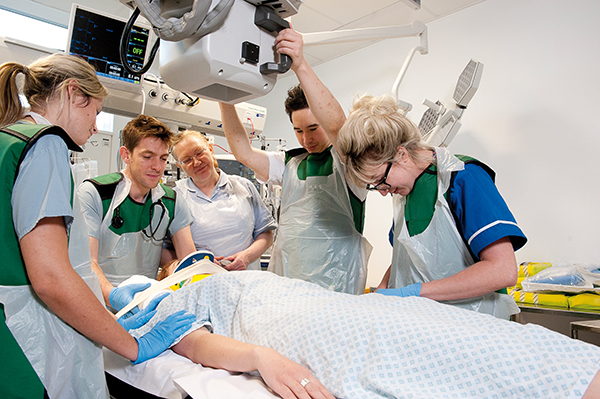Small cohort programmes which cannot expand, such as therapeutic radiography, will be at risk of closure unless universities have the incentive to continue to run and invest in this provision, the SCoR has warned the Department of Health in response to the proposals to reform how AHP student courses are funded.
“The Society and College believes risks to therapeutic and diagnostic radiography programmes are real”, the SCoR says in response to Reforming healthcare education funding: Creating a sustainable workforce.
“Both diagnostic and therapeutic radiography programmes are expensive to run due to the specialist teaching and simulation equipment required… If universities do not receive sufficient funding to cover the actual cost of running these programmes then they may not be seen as financially sustainable and thus be closed.”
The SCoR feedback also points out, “it is significantly more expensive to educate a diagnostic or therapeutic radiography student than it is students who are part of much larger cohorts.”
In addition, the SCoR highlights the threat to postgraduate courses: “Loans of £10,000 are designed around one year master’s programmes. They aren’t sufficient for two year programmes, which comprise both academic study and essential clinical practice.
“Where students are eligible to apply for funding through the Postgraduate Loans Scheme, they will be financially disadvantaged compared to BSc (Hons) pre-registration students. The Scheme repayment terms and interest rates are not the same as those for undergraduates.
“Additionally, postgraduate students will have to pay back their undergraduate and postgraduate loans concurrently.
“If undergraduate and postgraduate pre-registration students were paid a wage that was sufficient to cover their living costs and course fees, rather than receiving a loan, their contribution to the practice placements would be better recognised and they would feel part of the placement team. This could potentially lead to reduced attrition from programmes.”
The SCoR also questions practice placement expenses such as travel, accommodation, disclosure checks and uniform: “Reports from education providers and students (show) that retrospective reimbursement of expenses is financially crippling for some students.
“If there is an administrative error or misunderstanding, a delay in their reimbursement can mean students struggle to pay for basic essentials such as food, rent and transport to placements. Severe hardship is particularly prevalent among mature students and those who do not have families with the ability to support them financially.”
The SCoR's response highlights the potential dilemmas the consultation poses for mature students, particularly those who have a family.
The organisation comments, “Many able students who are single parents, or those without a family support network, will be disincentivised from applying to diagnostic radiography and therapeutic radiography programmes.”
Other issues covered in the SCoR’s feedback includes the affect on assistant practitioners and overseas students. It also says that the organisation is “very concerned that the funding changes, implemented over a very short timescale, with limited information, will destabilise radiography and wider allied health profession education.
“Prospective students are not currently able to make an informed choice about their future career.”
In summary, the SCoR notes the potential effect on patients, “There will be a huge negative impact on the education and provision of therapeutic and diagnostic radiographers to the workforce. This, in turn, will impact on the provision of high quality patient care.
“Without sufficient, well-educated diagnostic radiographers entering the workforce many patient care pathways will be adversely affected.
“Without sufficient, well-educated therapeutic radiographers, cancer treatment will be delayed.
“Without sufficient diagnostic and therapeutic radiographers, the consequences to patients will be potentially devastating.”
Last month, the Society co-authored a letter with other unions attacking the 'reckless cuts' to student funding.
You can also read more about what the changes entail here.
